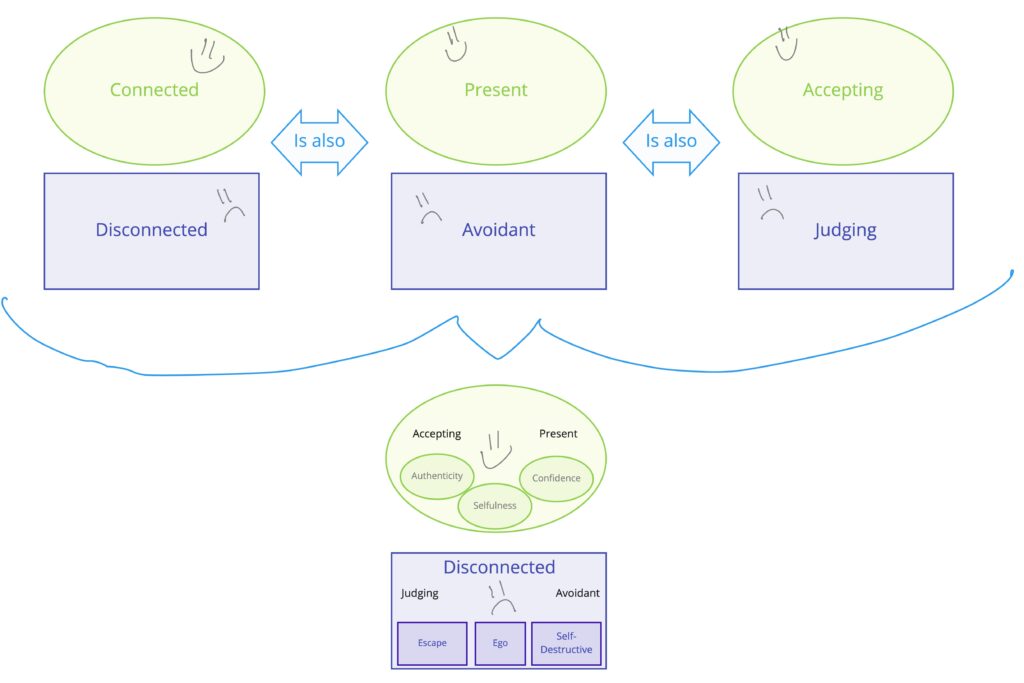connection is the key
there is one theme that that seems to cross all forms of literature.
the poets wax poetical about it; the novelists novelize it; the self-help gurus promote it, the psychologists prescribe it.
except, they don’t always call it connection.
connection goes by many names
heaven, nirvana, enlightenment, presence.
and the side-effects are as good as the synonyms: authenticity, flow, love, peace, integrity, strength, confidence. it’s no wonder it’s been such a popular topic through the ages.
it is immediately available, but easily lost. still, by exercising vulnerability, honesty with self, acceptance and appreciation you’ll find it again.
disconnection is a wolf in sheep’s clothing; and sometimes it’s just a wolf
if we’re going to talk about connection, we must include its opposite. when you’re disconnected, you’re not yourself. you’re focused on the future or the past. you’re worried about what people are going to think. you’re worried about not being good enough. this is the realm of escape; insecurity; force; sneakiness; bullying; bullshit.
it’s all a form of avoidance.
when you are connected, you are present; when you are disconnected, you are avoidant.
it does seem rather black and white, but the difference is often subtle – maybe that’s why so much has been written about it over the years.

so connection is good, and disconnection is bad?
in his book, A New Earth, Ekhart Tolle says,
If you are not in the state of either acceptance, enjoyment, or enthusiasm, look closely and you will find that you are creating suffering for yourself and others.
Ekhart Tolle
while statements like these help you check-in, they can also lead to a simplistic judgement of others and self.
a disconnected life is not without its merits. most of us live the majority of our lives in disconnection. everything that happens to you adds to your experience, your ability to feel, and your ability to connect with others. even your moments of disconnection.
plus, some of those moments are fun as hell. it can be a wild part of your exploration of self and can help you develop an understanding of others.
you can remain in disconnection and experience the thrill and pain of competing in a world where there is constant comparison. this can enhance your skills and provide a sense of motivation. and anxiety. constant anxiety. except when the depression takes over.
when you are disconnected, your values are set on things out of your control: getting everybody to like you; being the most popular kid in school, even though you’re 40. disconnection places you in a comparative mindset, and something will always be better than what you have. you’ll focus on the future and regret much of the past, and hustle, and psych yourself up, and hate yourself until you can psych yourself up again.
when you’re disconnected, you’re focused on the outside. your sense of acceptance gets handed to those around you. you relinquish your ownership of your own acceptance.
if you’re not accepting reality, you’re avoiding reality. and when you’re avoiding reality, you’ve put your sense of acceptance into the hands of others. you then look to the outside world to get a sense of being good enough and you start trying to live to their ever-changing standards.
you see, the connected, present mindset accepts things as they are. it doesn’t mean you can’t work toward change, but it does mean that when you can see the perfection in the moment, you open yourself up for connection.
connection is where your power resides
in other words, when you put your acceptance outside yourself, you outsource your power.
when you are in your power, when you are present, when you know yourself and trust yourself, you start to realize what Emerson was talking about:
A point of education that I can never too much insist upon is this tenet, that every individual man has a bias which he must obey, and that it is only as he feels and obeys this that he rightly develops and attains his legitimate power in the world.
Emerson
It is his magnetic needle, which points always in one direction to his proper path, with more or less variation from any other man’s. He is never happy nor strong until he finds it, keeps it; learns to be at home with himself; learns to watch the delicate hints and insights that come to him, and to have the entire assurance of his own mind.”
when we disconnect, we outsource our legitimate power, we fill with doubt and give in to our fears. we look outside for security and guarantees. but when we have the confidence of our own self-trust, there is strength; there is certainty, there is purpose; there is enoughness. and it is all this that gives you power. not the power to manipulate or control others (power over) but power-to and power-within.
connected to…what?
life. i think.
accepting yourself and others connects you to life – you accept it and its realities, you are present with it, you live it.
